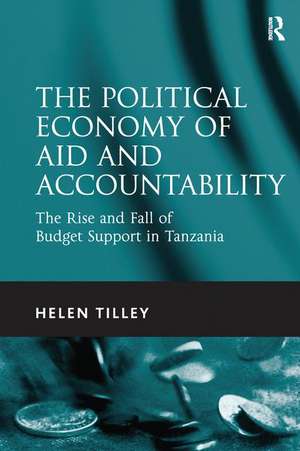The Political Economy of Aid and Accountability: The Rise and Fall of Budget Support in Tanzania
Autor Helen Tilleyen Limba Engleză Paperback – 9 sep 2016
| Toate formatele și edițiile | Preț | Express |
|---|---|---|
| Paperback (1) | 145.32 lei 6-8 săpt. | |
| Taylor & Francis – 9 sep 2016 | 145.32 lei 6-8 săpt. | |
| Hardback (1) | 368.21 lei 6-8 săpt. | |
| Taylor & Francis – 28 apr 2014 | 368.21 lei 6-8 săpt. |
Preț: 145.32 lei
Nou
Puncte Express: 218
Preț estimativ în valută:
27.81€ • 29.11$ • 23.01£
27.81€ • 29.11$ • 23.01£
Carte tipărită la comandă
Livrare economică 05-19 aprilie
Preluare comenzi: 021 569.72.76
Specificații
ISBN-13: 9781138247185
ISBN-10: 1138247189
Pagini: 168
Dimensiuni: 156 x 234 x 9 mm
Greutate: 0.45 kg
Ediția:1
Editura: Taylor & Francis
Colecția Routledge
Locul publicării:Oxford, United Kingdom
ISBN-10: 1138247189
Pagini: 168
Dimensiuni: 156 x 234 x 9 mm
Greutate: 0.45 kg
Ediția:1
Editura: Taylor & Francis
Colecția Routledge
Locul publicării:Oxford, United Kingdom
Notă biografică
Helen Tilley is a Research Fellow at ODI, London. She has extensive experience working with DFID, the World Bank, the European Commission, UNDP and governments in Africa and Asia, including two long-term advisory positions in Tanzania: with the Tanzanian government and donor agencies. She holds a PhD in Economics from the School of Oriental and African Studies, University of London.
Recenzii
’This pioneering book explores the often troubled relationship between donor concepts of accountability for development assistance and the way African leaders respond to their various domestic constituencies. Expertly dissecting the experience of budget support to Tanzania, Helen Tilley lifts the cloak of rhetoric and miscomprehension that obscures the place of aid in that country’s development.’ David Booth, Overseas Development Institute, UK 'Drawing on insights from economics, sociology, anthropology and political theory, this detailed case study of aid and accountability contributes significantly to the growing critique of the democratisation and good governance discourses that still underpin many aid programmes across Africa. As well as providing an original read for university teachers and students of African political economy, this book should also have an audience in aid agencies grappling with still unanswered questions of how to improve aid effectiveness.' Brian Cooksey, Tanzania Development Research Group, Tanzania 'Drawing on an in-depth study of the Tanzanian government’s "dance" with donors, Tilley explains how aid providers must avoid a purely box-ticking procedural approach to accountability. Instead they should add a relational component that sees the interaction between aid and domestic politics as critical to its success or failure, rather than an annoying interruption to technocratic delivery.’ Duncan Green, Senior Strategic Adviser, Oxfam UK ’This is a carefully analyzed and well documented study of the problems associated with implementing the Paris Declaration and its tenets like General Budget Support in Tanzania, a country that more than most has been a beneficiary of the OECD cartel of donors. It shows above all how simplistic notions of procedural accountability limit understanding of how aid money flows and is distributed through dominant power relations inside the country. As a call for a new aid paradig
Cuprins
Chapter 1 Introductionducing Accountability: The Old and the New; Chapter 2 Procedural Accountability: Necessary But Not Sufficient; Chapter 3 Relational Accountability: the Missing Component; Chapter 4 Aid Policy Failings: Bringing in Relational Accountability; Chapter 5 The Accountability Context in Tanzania; Chapter 6 The Interaction between Procedural and Relational Accountability: Foreign Aid in Tanzania; Chapter 7 A New Approach to Foreign Aid for Tanzania;
Descriere
The provision of aid is increasingly under scrutiny with increasing demands for results. This raises the question: what are our expectations from aid and are they realistic? Too often accountability is argued for without questioning if what is understood by the term is relevant or applicable. The Political Economy of Aid and Accountability explores the real meaning of accountability and argues for a new approach to aid more relevant to recipient countries.

